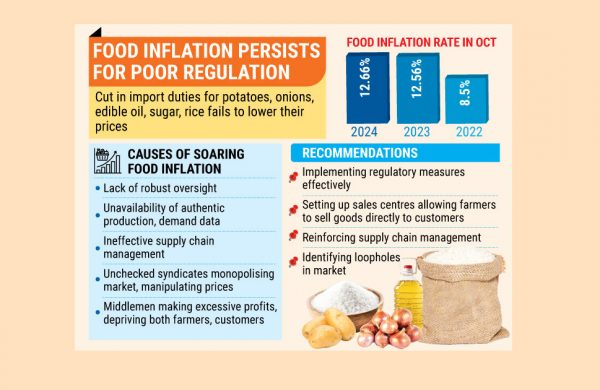Food inflation soars for weak oversight
- Update Time : Tuesday, November 12, 2024

TDS Desk
Bangladesh is grappling with surging prices of essential goods, a situation that highlights critical weaknesses in market regulation and supply chain management.
With unchecked gaps in the supply chain, inflationary pressures on food are mounting, putting significant strains on families across the country, said economists.
Lack of robust oversight, authentic production and demand data, and effective supply chain control has allowed inflation to persist, exacerbating the challenges for both consumers and businesses in Bangladesh’s food market.
The food inflation rate has been very high in the last three months due to higher prices of rice, egg, chicken, onion, vegetables and some other essential commodities.
The food inflation rate was 12.66% in October, 10.4% in September, 11.36% in August and 14.01% in July this year, according to the data from the Bangladesh Bureau of Statistics (BBS).
The food inflation was 12.56% in October and 12.37% in September of 2023. It was 8.5% in October and 9.08% in September of 2022, according to BBS.
“The interim government has taken different initiatives including reducing import duties and forming task forces, which are steps in the right direction. However, the instrument that they are applying needs to be effectively implemented,” said agricultural economist Dr Jahangir Alam Khan.
Prof ASM Golam Hafiz, a renowned farm economist, told the Daily Sun that the government needs to reinforce supply chain management and identify the loopholes in the market.
The unchecked syndicates that exploit supply chains are largely responsible for the soaring food inflation, he said.
“When only a small number of businessmen are involved in importing and supplying essential products to the market, they have the opportunity to control the prices. The essentials are being hoarded in the supply chain. Businessmen are doing this to make excessive profits,” he said.
“Prices are determined based on demand and supply. The process involved in meeting this demand is what we refer to as the supply chain. If these processes do not function properly, there is a higher risk of price increases,” said the economist.
“The government won’t have the real information of production and stock of the products in the country, because there is mismanagement in the production and stock data. It needs to be fixed,” he said.
“The government can’t control the middlemen if there is lack of monitoring. The farmers can’t get the fair prices for their products, but the consumers pay higher amounts to buy them at the retail level,” said the economist.
“The government should create a market management system for farmers. They should set up sales centres for farmers in which farmers will directly sell their products without the middlemen,” he said.
Agricultural economist Dr Jahangir Alam Khan told the Daily Sun that food production has been affected due to floods and a lean period of crop production. Besides, political unrest has affected the marketing channel.
“Moreover, the cost of production of crops increased due to overall inflation and devaluation of local currency,” he said.
The food inflation will drop in December as different local crops, including rice, winter vegetables, potatoes and onion, will appear in the market, said the economist.
The government lowered the duty on the imports of potatoes, onion, edible oil, sugar and rice alongside a reduction in taxes from 5 September to 17 October to reduce food inflation and stabilise the commodity market. However, the prices of these items have increased further in the retail market instead of decreasing following the measure.
Economists said only duty cuts will not be enough to halt the hike of commodity prices without a competitive market structure in place.















